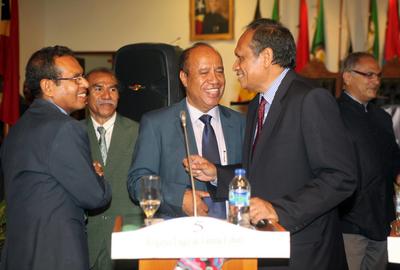Thirteen candidates will contest the presidential election, three of whom are considered to have a reasonable chance of success. The incumbent, José Ramos-Horta, is best known to outsiders and has been a well-liked if sometimes controversial president over the past five years. Ramos-Horta was Timor-Leste’s best-known international advocate during the country’s 24-year occupation by Indonesia, for which he jointly won a Nobel Peace Prize. He later went on to serve as foreign minister and briefly prime minister before being elected as Timor-Leste’s president in 2007.
In early 2008, Ramos-Horta was shot and critically wounded in a botched attempt to force an issue of amnesties for renegade soldiers who had participated in the politico-military crisis of 2006. As president, he has been responsible for a number of high-profile amnesties for prisoners, raising questions of impunity for serious crimes. But these amnesties, and his and Xanana Gusmão’s conciliatory line toward Indonesia over human rights trials, have greatly helped normalise relations between Timor-Leste and its giant neighbour. During his presidency, Ramos-Horta has also attempted to become involved in political issues, stretching what is a largely ceremonial role according to the country’s constitution.
But a falling out between Ramos-Horta and Prime Minister Gusmão over the past year or so now means that Ramos-Horta is very unlikely to receive substantial party support for his second presidential bid, which in 2007 helped him secure almost 70 per cent of the vote. He will therefore struggle to make it into the second round of voting for the presidency, scheduled for 14 April.
Much of the 2007 party support for Ramos-Horta has now shifted to the former commander of Timor-Leste’s armed forces, retired Brigadier-General José Maria Vasconcelos (otherwise known as ‘Taur Matan Ruak’ or ‘Two Sharp Eyes’). He has not detailed how he would fulfil the role of president but, to an even greater extent than Ramos-Horta, appears to have a more interventionist orientation than the constitution outlines. Vasconcelos has the support of the main governing coalition party, the National Congress for the Reconstruction of East Timor (CNRT), led by Gusmão, so will probably proceed to the second electoral round.
Fretilin’s candidate, Francisco ‘Lú-Olo’ Guterres, returns for another shot at the presidency in 2012 and can count on receiving approximately 30 per cent of the vote, similar to 2007. But with Ramos-Horta and Vasconcelos largely dividing the remaining votes between them, it is difficult to know how the second round of voting will play out.
As in 2007, the results of Timor-Leste’s third presidential election should indicate how parties will align following the 29 June parliamentary elections. It is widely expected that either CNRT or Fretilin will need to establish a coalition to form government, so the smaller parties will play an important role here.
Following the parliamentary elections, the new government will face two major challenges. The first will be resolving troubled negotiations over Woodside Petroleum’s plans for offshore processing of liquid natural gas from the Timor Sea. This project is estimated to be worth about US$18 billion and the government’s ability to effectively resolve tensions will be critical to Timor-Leste’s economic future. The second issue will be the withdrawal of the International Stabilisation Force, Australian and New Zealand soldiers, and Portuguese and Malaysian riot police, as well as the substantial drawdown of the UN’s presence. Now the question is whether Timor-Leste can go it alone.
Still, Timor-Leste has witnessed some notable achievements in other areas. For example, widespread agreement between opposing political leaders to stop gang-related violence, along with tougher anti-gang laws, means the problem has been largely resolved. And the issues that fuelled the 2006–07 violence have also been significantly ameliorated — there is now little question that Timor-Leste is a wealthier and more stable country than it was in the years leading up to the crisis.
Despite this relative stability, many underlying problems persist, including an almost entirely oil- and gas-dependent economy, massive unemployment, and improving but still very low human development indicators. All of these will continue to test the political fabric of this still-developing society. But a relatively peaceful election process would be a critical step on the nation’s long path toward stability and a better future.
Professor Damien Kingsbury is Director at the Centre for Citizenship, Development and Human Rights, Deakin University.


Let’s hope that this election will see a generational change in East Timorese politics and a changing of the old guard that has failed to uphold the constitutional separation of powers and the rule of law.